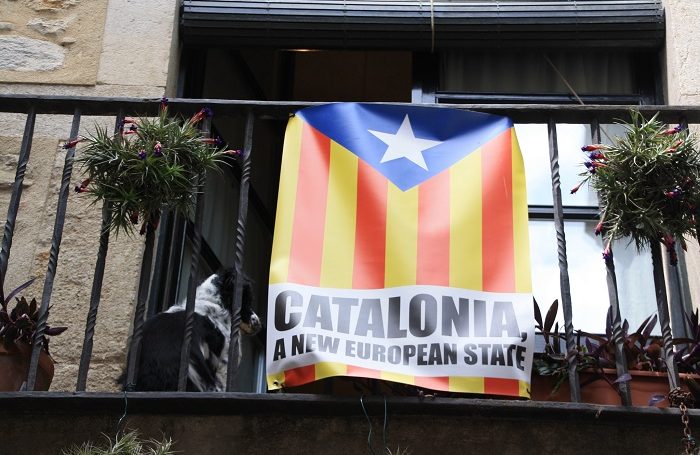
The nation-state is back. Despite repeated forecasts of the demise of states and the dawn of an electronically integrated ‘global village’ or ‘neo-medieval global society’ (see Hedley Bull’s The Anarchical Society) in which overlapping political structures and cross-cutting loyalties have supplanted national kinship, the first decades of the 21st century have seen a reassertion of both nationalism and statism. One facet of this ‘re-assertion’ is evident in the growing vitality of separatist movements in Scotland, Catalonia, Tibet, Quebec and elsewhere; another has been the rise of populist movements across Europe, Asia and the Americas calling on their governments to ‘take back control’ and demanding the re-erection of physical borders and trade barriers.
The ‘re-assertion’ of nation states has been especially noticeable in Europe. After decades of progressively pooling sovereignty and moving towards increasingly open borders, we currently see the rise of political parties across Europe that strive to restore national sovereignty—often by appealing to a combination of populist and xenophobic sentiments. To some, this reassertion is a direct consequence of the failings of the European Union. The EU was unsuccessful in averting the Euro-crisis and has failed to stem the growing wave of migration into Europe. It has also failed address looming threats of international terrorism and military aggression on Europe’s eastern borders. More fundamentally, the EU has failed to stimulate the emergence of a unified European populace. The draftsmen of European integration have constructed a vast, complex and faceless political bureaucracy, but, critics claim, have failed to kindle the birth of a European ‘demos’ which bestows legitimacy on this bureaucratic machinery and provides it with a clear political purpose and mandate. While the EU was once seen as the engine of peace, democracy and economic growth, Europeans increasingly feel that the best way to safeguard national interests is to reclaim sovereignty from Brussels.
Yet, as the essays in this symposium point out, the apparent resurgence of European nation-states is surely about more than the practical failings of the EU or its perceived democratic deficit. Looking around the world, it seems evident that ‘re-assertion’ is not confined to Britain or Europe. Rather, as Aviel Roshwald and Manu Bhagavan point out, the ‘fictions’ on which the current liberal-internationalist version of globalization rests—chiefly continued material improvement for all people at all times—is proving too brittle to serve as a viable source of legitimacy at a time when material progress appears to be stagnating or declining in many parts of the world. This in turn appears to have triggered a widespread desire to return to the mythical days of the fully sovereign nation-state, when one could shut national borders to immigration and trade and use the tools of devaluation and capital controls to escape currency crises and trade deficits.
Nonetheless, the notion of a ‘new nationalism’ asserting itself in response to a growing discontent with globalization may be too perfunctory. As John Erik Fossum points out, states (defined as governments and their institutions) and nations (groups of people that identify with each other for cultural, ethnic, linguistic or historical reasons) remain separate entities. In an EU context, for example, integration may be seen to have empowered states (by increasing their problem-solving capacity) whilst shrinking the space for nations to assert themselves. This implies a greater level of complexity when it comes to understanding both the nature and sources of the alleged ‘re-assertion’ of European nation-states as well as the possible implications of this reassertion. It is possible, for example, that we may witness a reassertion of nations without an accompanying reassertion of states, or that we may see a re-assertion of the nation-states’ ideological salience without a reassertion of its physical or practical salience.
At this point, optimists might point out that whereas aggressive nationalism has had disastrous consequences for Europe in the past, resilient and assertive nation-states—exerting the perceived right of peoples to govern themselves and to decide matters of domestic politics—need not be a bad thing, so long as they assert themselves internationally through cooperative arrangements based on common interests. Rather than embracing Trump’s insistence on the right of all nations to put their own interests first, this might simply imply a return to a more intergovernmentalist style of European cooperation.
We can thus discern an optimistic and a pessimistic perspective on ‘re-assertion’. For pessimists, the resurgence of the nation-state spells not only the end of multilateralism, internationalism, and the prosperity realized by globalization but also the (re)birth of an unbridled populism at the very heart of Western liberal democracy. For optimists, the reassertion of nation-states promises to rein in the excesses and inequalities spurred on by globalization, and to restore the ability of nation-states to act on domestic commitments to social solidarity and democracy. Both perspectives must clearly be taken seriously. Which view will end up being vindicated will depend in part on how liberal internationalists—still a majority in many European governments—respond to the challenge posed by resurgent nationalism. If they engage it constructively and seek to address some of the real grievances it expresses, things may turn out alright. If they seek to shut it down or, worse, pander to its darker sides for electoral gain, disaster may result.
Read on: Further contributions on this topic by Profs. Manu Bhagavan, Aviel Roshwald and John Erik Fossum will be uploaded here in the coming days…
Further Reading on E-International Relations
- Brexit and the 2019 European Elections
- Grexit and Brexit: Lessons for the European Union
- Post-Brexit EU Defence Policy: Is Germany Leading towards a European Army?
- The Nation-State: An Oxymoronic Relationship?
- European Parliaments in Times of Coronavirus
- The Days of May (Again): What Happens to Brexit Now?